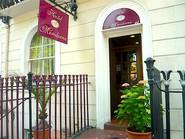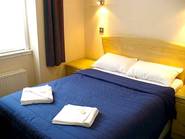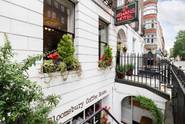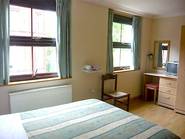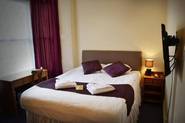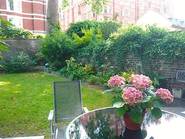What will your hotel be like in London? Elevator? Smoking? Breakfast? The most common questions are answered below.
FAQ: General London hotel questions
Are hotel receptions always open?
This completely depends on the Property. Most big hostels such as The Generator or proper hotels do offer 24-hour reception desks, while with a B&B, such as the cute Crescent Hotel, the reception is only open from 7:30 a.m. until 10 p.m. but guests are free to come and go as they please with their house key. Exceptions can be made for early/late arrivals, but you'll need to give the B&B some advanced warning.
The best thing to do is check with your hotel before you book to make sure that you will be able to get your key—even if you’re arriving on a Cheapo budget flight at two in the morning!
Are hotels safe? Any tips? Safest neighborhoods?
Most hotels offer a safe place to stay but it always pays to have your wits about you in London. Central London is always busy and there are pickpockets aplenty when you’re out and about on the streets. The crowds, however, also mean that arriving home late at night is safer than wandering quiet streets alone.
Hotels with 24-hour reception desks or good security on the main door are generally more secure, and if the hotel offers a safe then it’s definitely worth keeping valuables there when you go out. Larger hostels such as the YHA Oxford Street and the Astor Museum Inn will also provide lockers for your luggage when sharing a dorm with other guests—always make use of these to keep your belongings safe!
Can I arrive early / leave bags?
This service is common in London hotels. There are usually secure rooms to leave your luggage and some places offer left luggage lockers. Again, just make sure the reception desk will be manned at the time you need to collect your bags, especially if you’re leaving late at night or very early in the morning.
Can you smoke in hotels in London?
Definitely not! Smoking was banned from public spaces in the U.K. in 2007 and most hotel owners will be less than grateful if you make their beds smell of smoke.
Do hotels have elevators in London?
Again, this really depends on where you choose to stay. More upmarket hotels will always have elevators, whereas smaller hostels and B&B’s generally won’t, especially those in older properties.
The hotel reviews in our London Hotel Guide will state, under amenities, whether or not the hotel has an elevator or if it has especially steep stairs. But don’t let this be the be all and end all to your hotel choice—many accommodations will have ground floor rooms. If you do require step-free access then make that clear on booking to ensure the correct type of room is reserved for you.
Do hotels have Wi-Fi? Is it free?
Many London hotels do offer free Wi-Fi but if this is of utmost importance when choosing a hotel then be sure to double check. Most B&B’s and hostels, such as the Arosfa Hotel and The Seven Dials Hotel will offer free Wi-Fi to all guests. Some hotels, such as The Ridgemount, also offer a computer station for guests to use free of charge if they don't have a laptop. More budget options, such as the chain of EasyHotels in London will charge for any extras, including Wi-Fi.
If the Wi-Fi isn’t free at your chosen hotel then then ask for directions to a local library or café where you’ll often get access to the internet when you buy a coffee.
Do hotel receptionists speak English in London?
Yes!
Do you pay for children in hotels? What about beds for children?
This will totally depend on the age of the child and what kind of bed they require. Some hotels, like The George, provide free accommodation for children under three, whilst other hotels, such as The Mentone down the road, state that it is not suitable for children. Ibis hotels will always provide cots and children can stay for free for as long as they can share a bed with their parents – after that you need to pay for an extra room.
If you do require a cot, make sure you request one at the time of booking so that you don’t get caught out on arrival!
How big are the hotels in London?
That’s a bit like asking how long is a piece of string! Hotels, hostels and B&B’s in London vary hugely in size. The more expensive options will range from lavish luxurious hotels with hundreds of rooms, to exclusive boutique accommodations with up to ten rooms. Budget options are just as varied, from the monstrous 800-bed Generator, to the modest 20-room Princess Hotel.
The smaller options may have less in the way of facilities (very few can match The Generator’s nightclub, huge TV and games room or canteen), however they often have more character, such as the Arosfa Hotel’s quirkily furnished lounge and lovely garden, where the owner encourages guests to have barbecues in the summer months.
How do you reserve a room?
Generally, rooms can be booked online with a credit card. When you search on EuroCheapo, you will see the lowest room rate offered by one of our reservation partners—just click through to make your booking.
In some cases, EuroCheapo recommends hotels that do not offer online reservations. For these, you'll need to e-mail, call or click through to reserve on the hotel's website. (Contact information can be found under "more information" at the bottom of our review.)
How much do hotels generally cost?
You could spend a small fortune staying in some of London’s most glamorous hotels, but there are also great offers to be had if you know where to look. Most of the wallet-friendly hotels recommended on EuroCheapo don’t surpass $170 per night, which is pretty reasonable for a private room in central London. Make your budget go even further by opting for a hostel where you can bag a bed in a dorm room from just $49 per night. If you’re especially canny, you might even be able to get yourself a beautiful room for just £1 per night in one of the trendy Hoxton Hotel’s special £1 room sales.
Bank holidays, Easter and New Year’s Eve are all especially pricey times to visit London. You can find out more about the best times to visit here.
Is breakfast included? What's for breakfast?
Breakfast is generally included in your room rate and will always be included if you opt for a B&B (it’s in the name, really!). Many of the more traditional places, such as the Ridgemount Hotel, will serve proper English fry ups in the morning. A traditional English breakfast includes a whole lotta frying – fried eggs, bacon, tomatoes, bread and mushrooms, served with a side of baked beans. It may not be the healthiest start to the day but it certainly makes for excellent fuel if you're heading out to see the sights!
Other hotels and some hostels will offer a breakfast buffet where you can either opt for the fried stuff or enjoy fresh fruit and cereal.
The majority of hostels will charge a relatively small fee for brekkie, for example, all the YHA’s in London do a continental breakfast for £4.95 per person and a cooked breakfast for £5.95 per person. Hostels also normally have kitchens where you can prepare your own breakfast if you prefer.
What's a "typical" hotel like?
In London the main types of accommodation available are hotels, B&B’s and hostels.
A typical hotel will offer a comfortable, good-sized room with ensuite bathroom. The fittings will be high quality and you should generally feel you have all the facilities you could wish for (TV, hairdryer, wardrobe, telephone, etc.). There is also often a restaurant and sometimes a health center with gym and swimming pool. You can usually choose at booking whether or not you want breakfast included.
A B&B, or “Bed and Breakfast”, is normally more of a family-run affair and is often based in a traditional English house. While the standards may not be quite as high as a hotel, B&B’s generally offer more character and a more personal stay where you can meet the owner and get a glimpse into traditional London life. Often very centrally located, B&B’s offer private rooms, frequently with a choice of ensuite or shared bathroom, like at the MacDonald Hotel. There will normally be modest communal areas such as a lounge or garden. Breakfast is always included in the price.
Hostels generally attract a younger crowd who are happy to share a dorm room with strangers. A dorm room normally consists of a bunk bed in a shared room (usually between three and ten beds in a room). Bathrooms will be shared and are not normally ensuite. Possessions will be stored in a locker and communal areas are often very extensive. Many hostels have a kitchen to prepare your own food, as well as a snack shop, lounge, computer room and, in some cases, a nightclub or garden. There are often organized activities such as curry nights or group walks around London, making the whole experience much more sociable.

